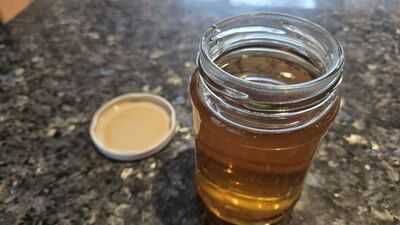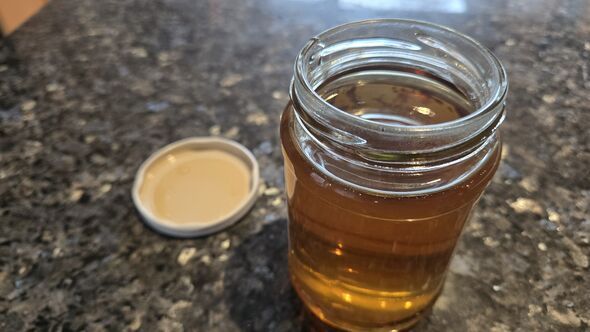

A warning has been issued to anyone buying honey in supermarkets - because there's a good chance it's 'fake'.
Honey has long been a staple product for households up and down the country, whether it's for spreading on toast, mixing into a cake or mixing into some lemon juice for to help lift a cold.
And with the cost of living crisis pushing up food prices over the past few years, you'd be forgiven for sidestepping expensive jars of honey, which can often fetch prices of £10 a jar, for cheap supermarket options, which can instead cost as little as 70p.
But honey experts are warning that cheap honey is probably too good to be true, and in fact, many are mixing in cheap ingredients and getting away with it thanks to loopholes in labelling laws.
Expert Just Bee Honey said: "Before I started writing this blog I took a trip to my local supermarket and bought a jar of 'Everyday Essentials Clear Honey'.
"The cost of this 340g jar was just 72p. I'm sure a similar product can be found in all supermarkets at varying prices.
"The label clearly states 'Clear Honey - All Natural' and anyone would be forgiven for thinking that it's a jar of pure natural honey, but it doesn't actually say that. Does it mean that the honey was naturally made (by bees) or just that the 'honey' is made with natural ingredients? Would a highly watered down honey still be 'all natural' as water is a natural product?"
Latin Honey Shop backs this up and stresses that supermarket honey often has pollen removed, which makes it very hard to determine its quality or provenance.
It explains how the way honey is treated, especially the cheap stuff, often takes way everything that makes it healthy, too.
It says: "Supermarket honey is filtered in a process which removes most, if not all, of its pollen. The removal of pollen from honey makes it impossible to determine its botanical origin, or whether is it even honey.
"A 2011 survey by Food Safety News on 60 different supermarket honeys in the United States found that 76% had no pollen at all. Most supermarket honey in the US is the same as that supplied to supermarkets in the UK.
"Honey without pollen is not honey, it's just a honey-flavoured sugary syrup."
In fact, you can probably tell from the label on the jar or bottle that it's fake due to a suspicious lack of provenance.
It adds: "The labels of most supermarket honey sold in the UK are marked, "Blend of EC/non-EC honeys." Such a vague description is proof that the honey contains little, if any, pollen.
"Honey starts its life as a living product which contains living nutrients, beneficial bacteria and enzymes. It is these nutrients that provide all the powerful health benefits of honey.
"These living nutrients can only survive up to a maximum hive temperature of 37C-40C/99F-104F. Above this temperature, they die.
"In order to prevent supermarket honey from crystallising, processors heat the honey up to 75C/160F.
"This process certainly delays the crystallisation process, but it also kills every beneficial living nutrient in the honey. Dead honey has no health benefits beyond providing a sugar rush.
"The mass market honey industry has got consumers used to wanting their honey as a clean, clear liquid. A clean, clear, scentless liquid is a sign of processed honey which has little or no health benefits.
Raw, real honey contains a number of particles which contain an immense number of health benefits. These particles include propolis, royal jelly and pollen, which provide honey with all its antibacterial, antifungal and antiviral properties.
"Many consumers eat honey thinking that they are consuming one of the healthiest natural substances known to man. This false sense of belief leads them to eat more honey, blissfully unaware that they are simply eating large quantities of sugar in liquid."
So if you want to eat honey, make sure that it is raw and unfiltered.
Put another way, if you are feeding your body supermarket honey, you may as well eat white sugar in water, because it is cheaper and quicker to obtain. (And it is less likely to contain harmful antibiotics."